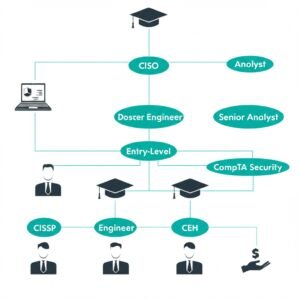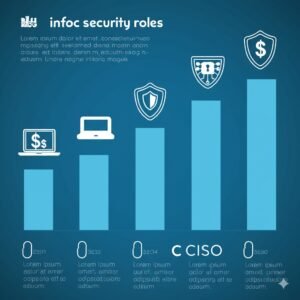Does Cybersecurity Pay Well? Top Salaries and Career Opportunities Explained
Have you ever wondered if working in cybersecurity is worth it when it comes to paychecks? The short answer is a resounding yes—cybersecurity professionals are some of the highest earners in the tech world. But what makes this field so lucrative? How can you position yourself to land one of these well-paying jobs?
From entry-level analysts to senior executives, salaries in cybersecurity vary widely depending on experience, certifications, location, and specialization. In this guide, we’ll break down exactly how much you can expect to earn, explore exciting career paths, and share tips to maximize your earning potential. Let’s dive in!
Why Are Cybersecurity Jobs So Sought After?
You don’t have to look far to see why cybersecurity experts are in such high demand. Every day, news headlines highlight massive data breaches, ransomware attacks, and other cyber threats targeting businesses and governments. These incidents cost organizations billions each year, making skilled professionals indispensable.

Here’s what’s driving the need for talent:
- Sophisticated Attacks: Hackers aren’t just amateurs anymore—they’re using advanced tools and techniques to bypass traditional defenses.
- Regulations Galore: Laws like GDPR and HIPAA mean companies must invest heavily in protecting customer data—or face hefty fines.
- Tech Boom: As more businesses adopt cloud computing, IoT devices, and artificial intelligence, they create new vulnerabilities that hackers love to exploit.
With all these factors at play, it’s no wonder employers are willing to shell out big bucks to hire top-notch talent.
How Much Can You Earn in Cybersecurity?
The salary range in cybersecurity is pretty impressive. Let’s take a closer look at what different roles typically pay:
Entry-Level Roles
If you’re just starting out, don’t worry—you won’t be stuck with peanuts. Entry-level positions often come with competitive paychecks, especially given the current talent shortage. Some common starter gigs include:
- Cybersecurity Analyst : Expect to earn anywhere from 85,000 per year. Your job will involve monitoring systems for suspicious activity and helping to patch vulnerabilities.
- IT Security Specialist : This role pays around 75,000 annually. Think of it as the first line of defense against cyber threats.
Even at this stage, many companies offer perks like bonuses or remote work options to attract fresh talent.

Mid-Level Roles
Once you’ve gained some experience (and maybe picked up a certification or two), your paycheck starts climbing even higher. Popular mid-career roles include:
- Penetration Tester (Ethical Hacker) : If breaking into systems legally sounds fun, this could be your dream job. Pen testers earn between 120,000 a year.
- Security Engineer : Responsible for building secure systems from scratch, security engineers rake in 130,000 annually.
At this level, having certifications like CISSP or CEH can give you a nice bump in pay.
Senior-Level Roles
For those who reach the upper echelons of the field, the sky’s the limit. Here are a couple of high-profile examples:
- Chief Information Security Officer (CISO) : As the head honcho of an organization’s security strategy, CISOs can pull in 300,000+ per year.
- Security Architect : Designing robust security frameworks nets architects between 180,000 annually.
These leadership roles not only come with fat paychecks but also offer long-term career stability and influence within organizations.
What Affects How Much You’ll Make?
Not everyone in cybersecurity earns the same amount—it depends on several factors. Here’s what plays a role:
1. Certifications
Earning industry-recognized certifications can seriously boost your income. For example, holding a CISSP or OSCP certification might increase your salary by 10–20%.
2. Location
Where you live matters—a lot. Cities like San Francisco and New York tend to pay top dollar due to their high cost of living and dense tech industries. On the flip side, remote work has made it possible to score high-paying gigs regardless of where you’re based.
3. Industry
Some sectors simply pay better than others. Financial institutions, healthcare providers, and government agencies often shell out premium salaries because they handle sensitive data and face strict compliance rules.
4. Specialization
Focusing on niche areas like cloud security, AI-driven threat detection, or blockchain protection can set you apart—and command higher wages.
Exciting Career Paths in Cybersecurity
One of the coolest things about cybersecurity is the sheer variety of roles available. Whether you’re into coding, problem-solving, or policy-making, there’s something for everyone. Here are a few standout options:
- Incident Responder : Think of yourself as a digital firefighter. When a breach happens, you’re the one rushing in to contain the damage.
- Cloud Security Expert : With so many businesses moving to the cloud, protecting these environments is a hot-ticket skill.
- Forensic Analyst : Love solving puzzles? Forensic analysts dig through digital evidence to figure out how attacks happened and who’s responsible.
- GRC Specialist : Short for Governance, Risk, and Compliance, this role ensures companies follow regulations and minimize risks.
Each path offers its own unique challenges and rewards.

Tips to Boost Your Earning Potential
Want to make sure you’re getting the best possible paycheck in cybersecurity? Here are a few strategies to keep in mind:
1. Get Certified
Certifications aren’t just pieces of paper—they’re proof that you know your stuff. Consider pursuing credentials like CISSP, CEH, or AWS Security Specialty depending on your goals.
2. Gain Real-World Experience
Nothing beats hands-on practice. Look for internships, freelance projects, or volunteer opportunities to build your skills and portfolio.
3. Stay Ahead of Trends
Cybersecurity moves fast. Follow industry blogs, attend conferences, and join online forums to stay updated on the latest tools and techniques.
4. Network Like Crazy
Building relationships with other pros can open doors to hidden job opportunities. Platforms like LinkedIn and communities like OWASP are great places to start.
5. Consider Advanced Education
While not mandatory, a master’s degree in cybersecurity or a related field can help you qualify for senior roles and negotiate higher salaries.

